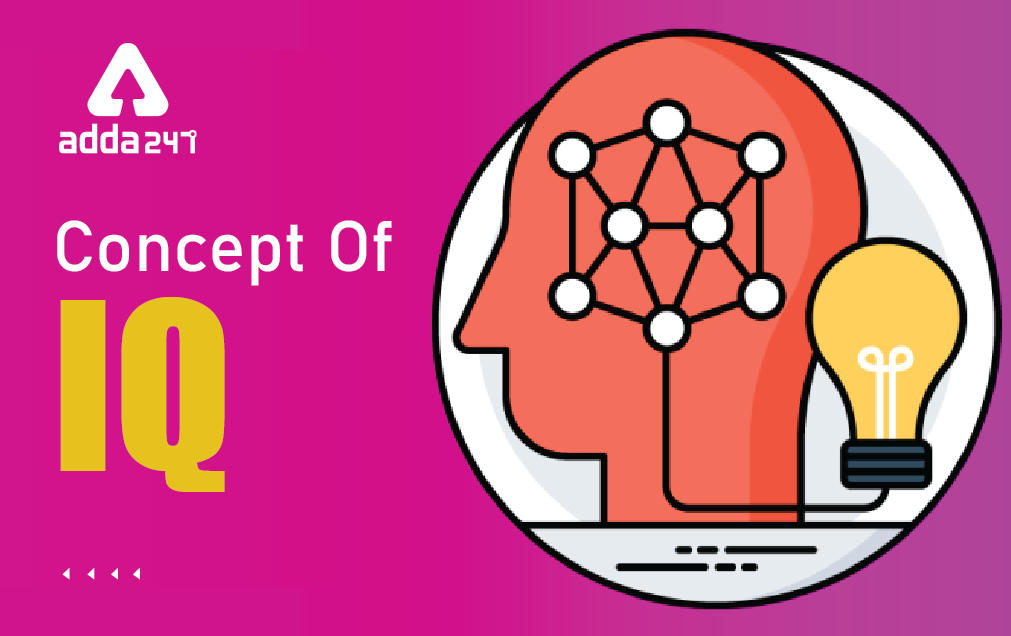Table of Contents
Concept Of IQ: IQ (Intelligent Quotient)is important topic of Child development section. IQ contains 3-4 mathematical calculative question in this section. IQ is formula based topic which we have explained below with the classification and probability curve. Lets learn here IQ with formulas , example.
Concept of IQ (IQ की अवधारणा)
William stern (1912), a German Psychologist, formulated the concept of intelligence Quotient (IQ)
एक जर्मन मनोवैज्ञानिक विलियम स्टर्न (1912) ने बुद्धि लाब्धि (IQ) की अवधारणा तैयार की।
1. IQ is defined as “A numerical value that reflects the extent to which an individual’s score on an intelligence test departs from the average for other people of the same age.
IQ को “एक संख्यात्मक मान के रूप में परिभाषित किया गया है जो एक बुद्धि परीक्षण पर किसी व्यक्ति का स्कोर उसी हद तक दर्शाता है जो समान आयु के अन्य लोगों के लिए औसत से निकलता है।
2. IQ is measured in term of mental age (MA) and chronological age (CA). Binet (1908) intoduced the idea mental age. Mental age is defined. As “an expression of the extant of development achieved by the individual stated in term of the performance that can eb expected at any given age.” MA generally refers to mental maturity of a person corresponding to his level of performance in an intelligent test. CA refers to the age in years, months and hours. This is calculated from the time and date of birth of the individual.
IQ को मानसिक आयु (MA) और कालानुक्रमिक आयु (CA) की अवधि में मापा जाता है। बिनेट ने मानसिक आयु का विचार पेश किया। मानसिक आयु को “प्रदर्शन की अवधि में व्यक्तिगत स्थिति द्वारा प्राप्त विकास की सीमा की अभिव्यक्ति के रूप में परिभाषित किया जाता है जो किसी भी उम्र में अपेक्षित हो सकता है।“ MA आमतौर पर एक बुद्धि परीक्षण में अपने प्रदर्शन के स्तर के अनुरूप व्यक्ति की मानसिक परिपक्वता को दर्शाता है। CA का तात्पर्य वर्षों, महीनों और घंटों में आयु से है। यह व्यक्ति के जन्म के समय और तिथि से गणना की जाती है।
3. An intelligent quotient is an index of intelligence. It is a comparative index showing how a particular child performs when compared with others of the same chronological age. The formula for finding intelligent quotient is:
IQ=MA⁄CA 100 where 100 is to avoid decimals
बुद्धि लाब्धि बुद्धि का सूचकांक है। यह एक तुलनात्मक सूचकांक है जो दर्शाता है कि एक ही कालानुक्रमिक उम्र के अन्य लोगों की तुलना में एक विशेष बच्चा कैसे प्रदर्शन करता है। बुद्धि लाब्धि ज्ञात करने का सूत्र है:
IQ=MA⁄CA 100 जिसमें 100 दशमलव को टालने के लिए है
IQ implies that it is said to be a ratio between mental age and chronological age. MA includes basal age and partial credit. Basal age is that age of the child with reference to CA where he can solve all questions in a test. For example, we have a child with CA = 8. He solves questions meant for child of CA 10. He solves 20 questions out of 60 questions meant for a child of 10.
IQ का तात्पर्य है कि इसे मानसिक आयु और कालानुक्रमिक आयु के बीच का अनुपात कहा जाता है। MA में बुनियादी उम्र और आंशिक क्रेडिट शामिल हैं। बुनियादी उम्र, CA के संदर्भ में बच्चे की वह उम्र है जहां वह एक परीक्षा में सभी प्रश्नों को हल कर सकता है। उदाहरण के लिए, हमारे पास CA = 8 का एक बच्चा है। वह CA 10 के बच्चे के लिए पूछे गए प्रश्नों को हल करता है। वह 10 वर्ष के एक बच्चे के लिए निर्धारित 60 प्रश्नों में से 20 प्रश्नों को हल करता है।
Thus MA = Basal age + Partial Credit.
= 10 years + 4 months (20/60 of a year)
इस प्रकार MA = बुनियादी उम्र + आंशिक क्रेडिट.
= 10 वर्ष + 4 महीने (एक वर्ष का 20/60)
Constancy of IQ ( IQ की स्थिरता)
There are of two opinions among psychologist regarding constancy of IQ.
IQ की स्थिरता के बारे में मनोवैज्ञानिकों के बीच दो राय हैं।
1.IQ remains constant over the years, (IQ वर्षों तक स्थिर रहता है,)
(a) We see from daily life that intelligence is not constant. As one grows in age, his intelligence also increases. But the fact remains that IQ will remain constant when we continue growing in year, because it is a ratio.
हम दैनिक जीवन में देखते हैं कि बुद्धि स्थिर नहीं होती है। जैसे-जैसे उम्र बढ़ती है, उसकी बुद्धि भी बढ़ती जाती है। लेकिन तथ्य यह है कि उम्र बढ़ने के साथ भी IQ स्थिर रहता है, क्योंकि यह एक अनुपात है।
(b) IQ reaches its limit when we attains 21 or 22 years of age.
जब हम 21 या 22 वर्ष की आयु प्राप्त करते हैं, तो IQ अपनी सीमा तक पहुँच जाता है।
(c) In later years (after 22) the capacity of tackling the various problems of life increases not because of IQ but experience.
बाद के वर्षों में (22 के बाद) जीवन की विभिन्न समस्याओं से निपटने की क्षमता IQ की वजह से नहीं बल्कि अनुभव से बढ़ती है।
2. IQ can be changed by means of a determined effort. (IQ एक निर्धारित प्रयास के माध्यम से बदला जा सकता है)
(a) Although IQ normally remains constant some significant changes are noted from year to year. These changes may be within 10 points of IQ.
हालाँकि, IQ सामान्य रूप से स्थिर रहता है, लेकिन साल-दर-साल कुछ महत्वपूर्ण बदलाव होते रहते हैं। ये परिवर्तन IQ के 10 बिंदुओं के भीतर हो सकते हैं।
(b) The changes or variations are due to (i) kindergarten experience of children (ii) Education of parents (iii) Socio – economic status of the parents (iv) Occupational status of the parents (v) General environment at home and school (vi) Effect of practice of children , and (vii) Unreliability of the test.
यह परिवर्तन या भिन्नता होती हैं (i) बच्चों के किंडरगार्टन अनुभव के कारण (ii) माता-पिता की शिक्षा के कारण (iii) माता-पिता की सामाजिक आर्थिक स्थिति के कारण (iv) माता-पिता की व्यावसायिक स्थिति के कारण (v) घर और स्कूल में सामान्य वातावरण के कारण (vi) बच्चों के अभ्यास के प्रभाव के कारण और (vii) परीक्षण की अविश्वसनीयता के कारण।
Classification and Distribution of IQ (IQ का वर्गीकरण और वितरण)
According to Stanford-Binet Scale of intelligence brought out by Terman (1916), the classification of IQ is given below.
टरमन (1916) द्वारा निकाली गई बुद्धि के स्टेनफोर्ड-बिनेट स्केल के अनुसार, IQ का वर्गीकरण नीचे दिया गया है:
I.Q. अंकों का वितरण (सचित्र प्रदर्शन)
In a large population of people, IQ scores will tend to be distributed on a normal (bell-shaped) curve.
लोगों की एक बड़ी आबादी में, IQ का अंक सामान्य वक्र (घंटी के आकार का) पर वितरित किया जाएगा.
Concept Of IQ: IQ Classification Intelligent Quotient PDF in Hindi
Read Also :
| CTET News | KVS News |
| UP TGT PGT News | UGC NET News |



 HPSC Assistant Professor Admit Card 2025...
HPSC Assistant Professor Admit Card 2025...
 RPSC 2nd Grade Teacher Vacancy 2025 Noti...
RPSC 2nd Grade Teacher Vacancy 2025 Noti...
 UPESSC Assistant Professor Exam Date 202...
UPESSC Assistant Professor Exam Date 202...




